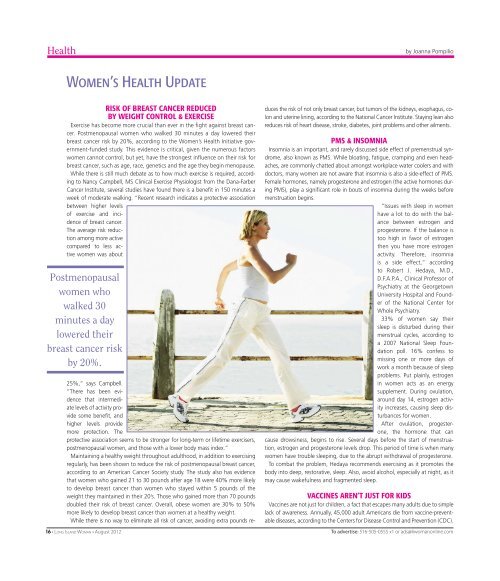Judith Light
Judith Light
Judith Light
You also want an ePaper? Increase the reach of your titles
YUMPU automatically turns print PDFs into web optimized ePapers that Google loves.
Health<br />
by Joanna Pompilio<br />
Women’s Health Update<br />
RISK OF BREAST CANCER REDUCED<br />
BY WEIGHT CONTROL & EXERCISE<br />
Exercise has become more crucial than ever in the fight against breast cancer.<br />
Postmenopausal women who walked 30 minutes a day lowered their<br />
breast cancer risk by 20%, according to the Women’s Health Initiative government-funded<br />
study. This evidence is critical, given the numerous factors<br />
women cannot control, but yet, have the strongest influence on their risk for<br />
breast cancer, such as age, race, genetics and the age they begin menopause.<br />
While there is still much debate as to how much exercise is required, according<br />
to Nancy Campbell, MS Clinical Exercise Physiologist from the Dana-Farber<br />
Cancer Institute, several studies have found there is a benefit in 150 minutes a<br />
week of moderate walking. “Recent research indicates a protective association<br />
between higher levels<br />
of exercise and incidence<br />
of breast cancer.<br />
The average risk reduction<br />
among more active<br />
compared to less active<br />
women was about<br />
Postmenopausal<br />
women who<br />
walked 30<br />
minutes a day<br />
lowered their<br />
breast cancer risk<br />
by 20%.<br />
16August 2012<br />
25%,” says Campbell.<br />
“There has been evidence<br />
that intermediate<br />
levels of activity provide<br />
some benefit, and<br />
higher levels provide<br />
more protection. The<br />
protective association seems to be stronger for long-term or lifetime exercisers,<br />
postmenopausal women, and those with a lower body mass index.”<br />
Maintaining a healthy weight throughout adulthood, in addition to exercising<br />
regularly, has been shown to reduce the risk of postmenopausal breast cancer,<br />
according to an American Cancer Society study. The study also has evidence<br />
that women who gained 21 to 30 pounds after age 18 were 40% more likely<br />
to develop breast cancer than women who stayed within 5 pounds of the<br />
weight they maintained in their 20’s. Those who gained more than 70 pounds<br />
doubled their risk of breast cancer. Overall, obese women are 30% to 50%<br />
more likely to develop breast cancer than women at a healthy weight.<br />
While there is no way to eliminate all risk of cancer, avoiding extra pounds reduces<br />
the risk of not only breast cancer, but tumors of the kidneys, esophagus, colon<br />
and uterine lining, according to the National Cancer Institute. Staying lean also<br />
reduces risk of heart disease, stroke, diabetes, joint problems and other ailments.<br />
PMS & INSOMNIA<br />
Insomnia is an important, and rarely discussed side effect of premenstrual syndrome,<br />
also known as PMS. While bloating, fatigue, cramping and even headaches,<br />
are commonly chatted about amongst workplace water coolers and with<br />
doctors, many women are not aware that insomnia is also a side-effect of PMS.<br />
Female hormones, namely progesterone and estrogen (the active hormones during<br />
PMS), play a significant role in bouts of insomnia during the weeks before<br />
menstruation begins.<br />
“Issues with sleep in women<br />
have a lot to do with the balance<br />
between estrogen and<br />
progesterone. If the balance is<br />
too high in favor of estrogen<br />
then you have more estrogen<br />
activity. Therefore, insomnia<br />
is a side effect,” according<br />
to Robert J. Hedaya, M.D.,<br />
D.F.A.P.A., Clinical Professor of<br />
Psychiatry at the Georgetown<br />
University Hospital and Founder<br />
of the National Center for<br />
Whole Psychiatry.<br />
33% of women say their<br />
sleep is disturbed during their<br />
menstrual cycles, according to<br />
a 2007 National Sleep Foundation<br />
poll. 16% confess to<br />
missing one or more days of<br />
work a month because of sleep<br />
problems. Put plainly, estrogen<br />
in women acts as an energy<br />
supplement. During ovulation,<br />
around day 14, estrogen activity<br />
increases, causing sleep disturbances<br />
for women.<br />
After ovulation, progesterone,<br />
the hormone that can<br />
cause drowsiness, begins to rise. Several days before the start of menstruation,<br />
estrogen and progesterone levels drop. This period of time is when many<br />
women have trouble sleeping, due to the abrupt withdrawal of progesterone.<br />
To combat the problem, Hedaya recommends exercising as it promotes the<br />
body into deep, restorative, sleep. Also, avoid alcohol, especially at night, as it<br />
may cause wakefulness and fragmented sleep.<br />
VACCINES AREN’T JUST FOR KIDS<br />
Vaccines are not just for children, a fact that escapes many adults due to simple<br />
lack of awareness. Annually, 45,000 adult Americans die from vaccine-preventable<br />
diseases, according to the Centers for Disease Control and Prevention (CDC).<br />
To advertise: 516-505-0555 x1 or ads@liwomanonline.com
















